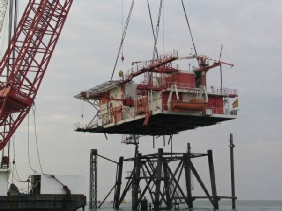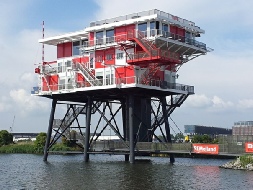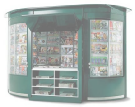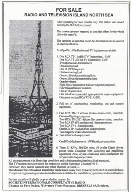© 2014-

TV Noordzee (4)
Both Radio and TV Noordzee had proved highly popular with audiences and advertisers alike and during the three and a half months the two stations were on the air advertising income exceeded £300,000 -
The loss of Radio, and especially TV, Noordzee was not just one felt by audiences. The Dutch film industry, which had benefited substantially from the television station's existence, lost a large amount of work in producing commercials and continuity announcements, while the Dutch advertising industry lost the opportunity to generate income from the sale of airtime to clients as well as the investment many agencies had made in television commercial production facilities.
After Radio/TV Noord zee was forcibly closed in December 1964 REM Island lay derelict for ten years. Between 1974 and 2004 the Island was used by the Dutch government as a base from which it could measure sea temperature and salt concentration.
zee was forcibly closed in December 1964 REM Island lay derelict for ten years. Between 1974 and 2004 the Island was used by the Dutch government as a base from which it could measure sea temperature and salt concentration.
After offering the island for sale in 2004 without finding a buyer, the government dismantled it in September 2006 and brought it ashore to Flushing Harbour, where it remained for over two years.
In 2008 housing association De Key came up with a plan to save the REM Island and transform it into a restaurant. With approval from Amsterdam Port Authority the developers purchased and completely renovated the now dismantled REM Island at Feerwerd in the Province of Groningen, with a plan to include it as a key feature in the Houthaven development project.
The Houthaven (literally, wood harbour) was formerly used to store and transfer wood. It is being transformed into a residential area, with some 2,000 houses built on artificial islands, together with schools and retail space. The REM island now forms part of the redevelopment and opened as a restaurant in July 2011.
In 1965 the TROS organisation which had been founded by investors involved in the REM Project acquired the right to airtime on the legal Dutch radio and television networks, and has since become one of Holland's most respected broadcasting organisations.



Click on picture to enlarge
REM Island restaurant in The Houthaven
REM Island being dismantled at sea, September 2006
The conversion of REM Island, into a restaurant


Television Mail
22nd October 1965




Floor 2
Back to






